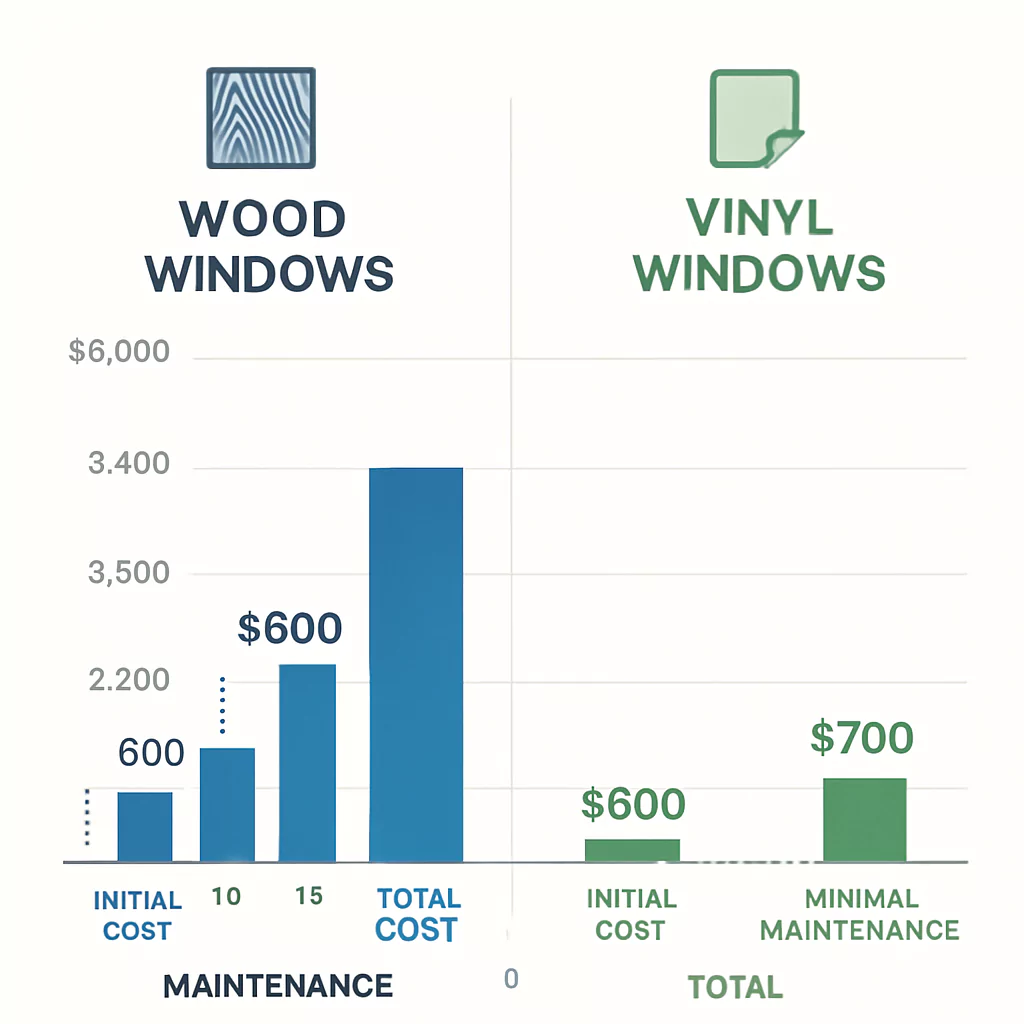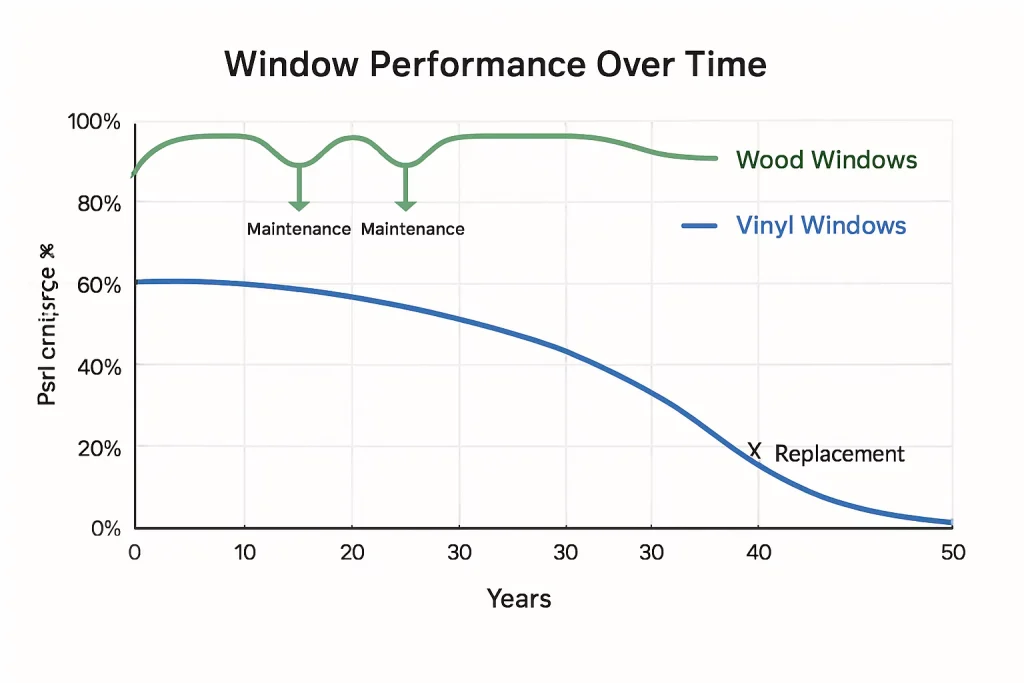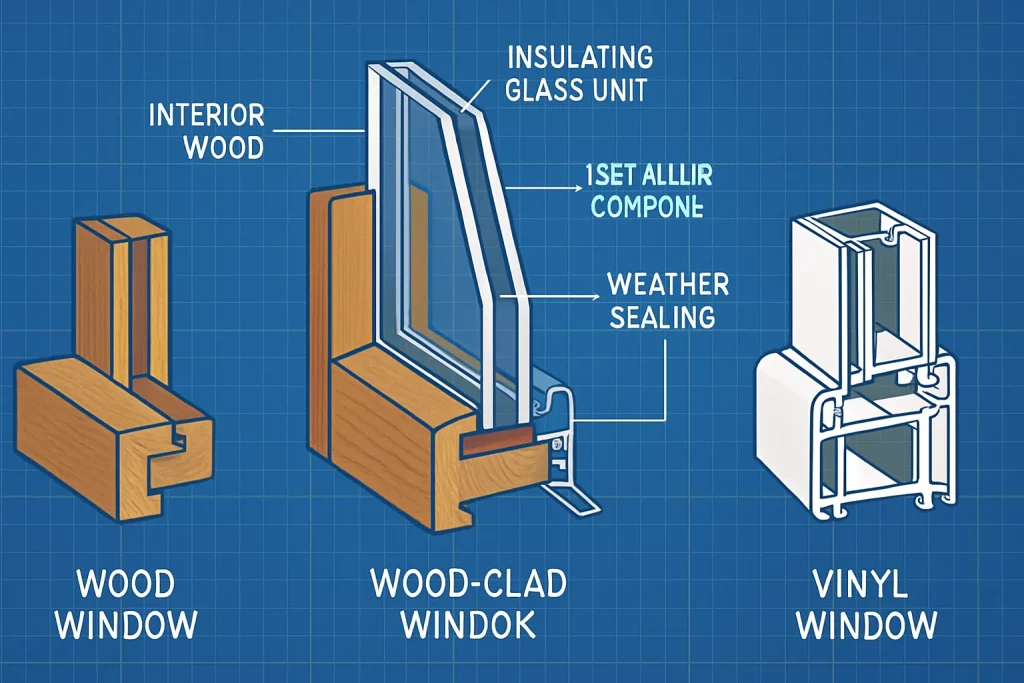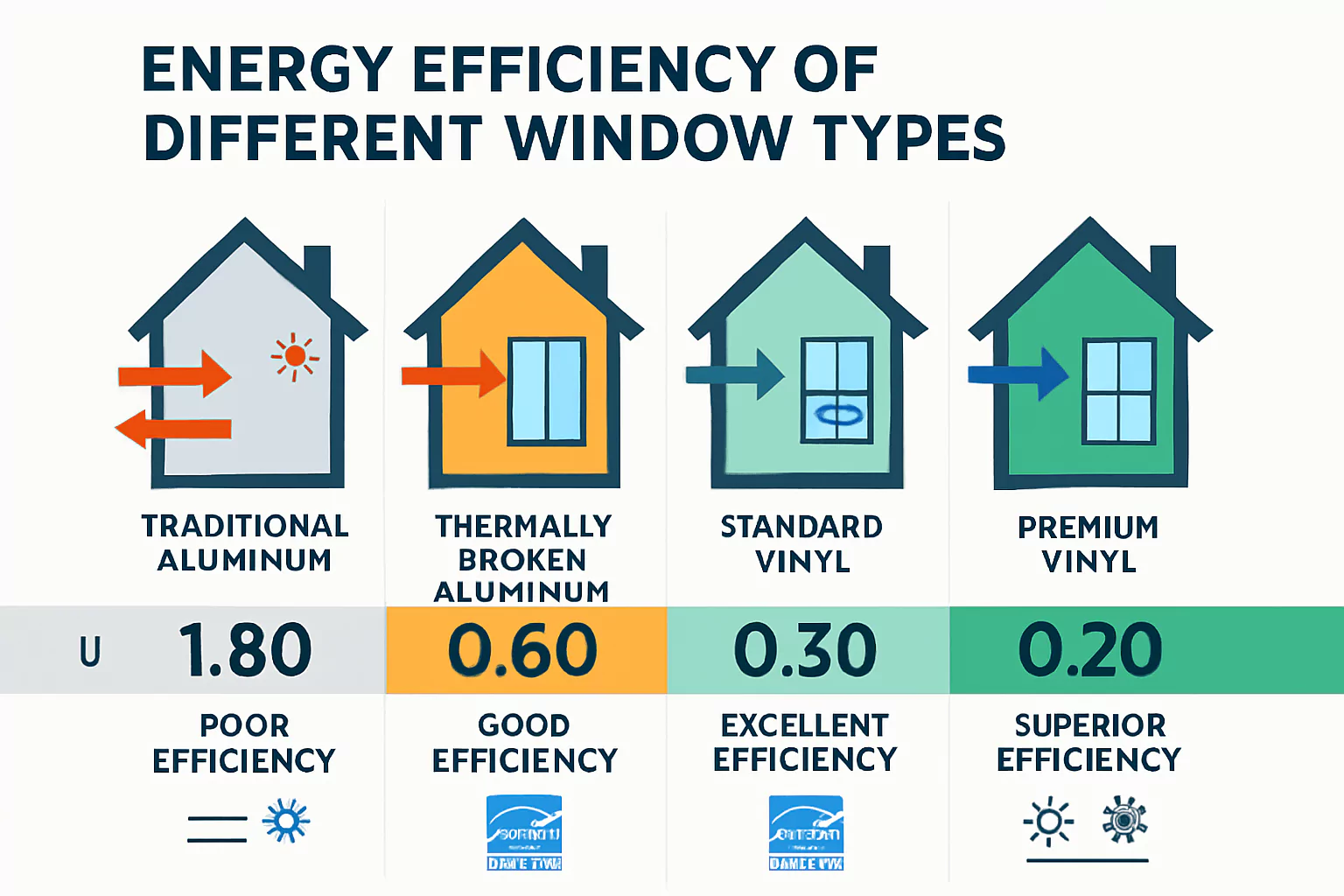Your windows are the eyes of your home—they define its character, control its comfort, and dramatically impact your energy bills. Walk through any neighborhood and you’ll immediately notice the difference between homes with cheap, builder-grade windows and those with quality, well-chosen replacements. The windows you choose today will shape your home’s appearance and performance for decades to come.
When it comes to window materials, homeowners today have more options than ever. While our fiberglass vs vinyl windows comparison explores the modern performance battle between synthetic materials, the classic debate remains: wood (the timeless beauty that has graced homes for centuries) versus vinyl (the practical innovation that revolutionized home improvement).

Each represents a fundamentally different philosophy of home ownership—one prioritizes aesthetics and tradition, the other focuses on performance and convenience. Understanding this distinction is crucial because your choice will affect not just your home’s appearance, but your lifestyle and budget for the next 20-50 years.
This comprehensive guide cuts through the marketing hype to deliver an honest, detailed comparison. By the end, you’ll know exactly which material aligns with your priorities—and why this decision matters more than most homeowners realize.
At a Glance: The Ultimate Wood vs. Vinyl Comparison Chart
Before diving into the details, here’s how wood and vinyl windows stack up across the most important factors:
| Feature | Wood Windows | Vinyl Windows |
|---|---|---|
| Aesthetics | Unmatched natural beauty, paintable/stainable | Clean, simple look, limited colors |
| Initial Cost | High (2-3x vinyl cost) | Low |
| Maintenance | High (painting/sealing every 5-7 years) | Very Low (cleaning only) |
| Lifespan | 30-100+ years (with proper care) | 25-45 years |
| Energy Efficiency | Excellent natural insulator | Excellent insulator |
| Customization | Unlimited colors and finishes | Limited integrated colors |
| Resale Value | High premium appeal | Standard/Good value |
| Climate Suitability | Requires protection from moisture | All climates |
| Repair Options | Highly repairable | Limited repair options |
| Historic Compatibility | Perfect for period homes | Modern homes only |
Note: If you’re also considering fiberglass windows, our complete window material comparison guide covers all three materials side-by-side.
Aesthetics & Appearance: The Battle for Curb Appeal
Wood: The Gold Standard of Beauty
There’s simply no substitute for the natural warmth and character of real wood. Wood windows offer an authenticity that no synthetic material can replicate—the subtle grain patterns, the way light plays across the surface, and the solid, substantial feel that speaks of quality craftsmanship.
The aesthetic advantages of wood:
- Natural beauty: Each piece of wood is unique, with grain patterns and characteristics that add personality to your home
- Unlimited customization: Wood can be painted any color imaginable or stained to showcase its natural beauty
- Timeless appeal: Wood windows never go out of style and work with any architectural period
- Premium appearance: Wood immediately signals quality and attention to detail
- Authentic character: Essential for historic home window restoration projects
Wood windows are particularly stunning in:
- Historic homes where authenticity affects both value and historical designation
- Traditional architectural styles like Colonial, Victorian, or Craftsman
- Luxury homes where premium materials are expected
- Custom homes where unique character justifies the investment
For homeowners committed to authentic restoration, our guide to preserving original wood windows provides detailed information on restoration versus replacement decisions.
Vinyl: The Practical, Modern Choice
Vinyl windows offer a clean, streamlined appearance that works well with contemporary home styles. While they may lack the natural warmth of wood, they provide a crisp, uniform look that many homeowners find appealing, especially when choosing energy-efficient windows is the primary concern.
The aesthetic characteristics of vinyl:
- Clean lines: Smooth, consistent surfaces that create a modern appearance
- Integrated color: Color goes all the way through the material, so scratches don’t show
- Uniform appearance: Every window looks identical, creating visual consistency
- Simple profiles: Straightforward designs that don’t compete with other architectural elements
Vinyl limitations:
- Limited color options: Typically available in white, tan, beige, and a few other light colors
- Cannot be painted: Once you choose a color, you’re committed to it
- Synthetic appearance: Lacks the natural depth and character of wood
- Thicker frames: Structural requirements often result in bulkier profiles
Understanding how vinyl windows are manufactured helps explain these aesthetic limitations and why color choices are restricted.
Cost Analysis: Upfront Price vs. True Cost of Ownership

The Initial Price Tag Reality
When it comes to upfront costs, vinyl windows are the undisputed budget champion. However, unlike the cost comparison between fiberglass and vinyl, where the materials are closer in price, wood windows represent a significant premium investment.
Typical cost ranges (including installation):
- Vinyl windows: $450-$800 per window
- Wood windows: $800-$1,600 per window
- Premium wood windows: $1,200-$2,500+ per window
For a comprehensive breakdown of window replacement costs across all materials, see our complete window replacement cost guide.
The Hidden Reality: Wood’s Ongoing Maintenance Costs
Unlike vinyl or fiberglass, wood windows require ongoing maintenance that adds significantly to their lifetime cost. This is where many homeowners underestimate the true investment required.
Professional maintenance every 5-7 years:
- Inspection and preparation: $150-$300 per window
- Sanding and priming: $200-$400 per window
- Painting or staining: $250-$500 per window
- Total maintenance cost: $600-$1,200 per window every 5-7 years
20-Year Cost Comparison Example
Wood Window:
- Initial cost: $1,200
- Professional maintenance (4 cycles): $2,400-$4,800
- Total 20-year cost: $3,600-$6,000
Vinyl Window:
- Initial cost: $600
- Maintenance: $50-$100 (cleaning supplies)
- Total 20-year cost: $650-$700
This dramatic difference explains why many homeowners consider low-maintenance window alternatives when budget is a primary concern.
Maintenance & Upkeep: The Reality of Ownership
Wood: The High-Maintenance Beauty
Wood windows require dedicated care to maintain their appearance and structural integrity. This maintenance isn’t optional—it’s essential to prevent rot, decay, and premature failure. Our comprehensive wood window maintenance guide provides detailed seasonal checklists.
The real maintenance tasks for wood windows:
Regular maintenance (every 5-7 years):
- Step 1: Remove old paint or stain using sanders or chemical strippers
- Step 2: Repair any wood damage with wood filler or replacement pieces
- Step 3: Sand all surfaces smooth and clean thoroughly
- Step 4: Apply high-quality primer to all bare wood
- Step 5: Apply multiple coats of paint or stain with proper drying time
- Step 6: Replace weather stripping and caulking as needed
The consequences of neglect:
- Rot and decay: Untreated wood can rot within 2-3 years in wet conditions
- Insect damage: Termites and carpenter ants are attracted to moisture-damaged wood
- Structural failure: Severely damaged wood windows may need complete replacement
- Energy loss: Failed seals and warped frames compromise window energy efficiency
Vinyl: The “Set It and Forget It” Option
Vinyl windows are designed for homeowners who want performance without maintenance headaches. This makes them particularly appealing for those comparing vinyl versus other low-maintenance materials.
Vinyl maintenance requirements:
Annual maintenance:
- Cleaning: Wash with soap and water 2-3 times per year
- Hardware lubrication: Apply silicone spray to locks and hinges
- Inspection: Check weather stripping and caulking around frames
What you’ll never need to do:
- Paint or stain
- Sand or scrape
- Repair rot or insect damage
- Extensive surface preparation
- Seasonal touch-ups
For detailed maintenance schedules, see our vinyl window care guide.
Durability & Lifespan: Which Material Lasts Longer?

Wood: The Century-Long Champion (With Proper Care)
Wood windows have an impressive track record when properly maintained. Some wood windows in historic homes have been functioning for over 100 years, which is why historic window restoration is often more cost-effective than replacement.
Wood window lifespan factors:
With excellent maintenance:
- 50-100+ years: Premium wood windows with religious maintenance
- 30-50 years: Good quality wood windows with regular care
- 20-30 years: Standard wood windows with consistent maintenance
With poor maintenance:
- 10-15 years: Neglected wood windows in harsh climates
- 5-10 years: Severely neglected windows in wet conditions
Vinyl: The Reliable Performer
Vinyl windows offer predictable performance and lifespan, making them easier to plan for in home maintenance budgets. Our vinyl window lifespan guide provides detailed information on maximizing their durability.
Typical vinyl window lifespan:
- 25-30 years: Premium vinyl windows with quality construction
- 20-25 years: Standard vinyl windows with good care
- 15-20 years: Basic vinyl windows or those in harsh climates
Energy Efficiency: A Surprisingly Close Race
One of the biggest misconceptions about wood vs. vinyl windows is that one material is significantly more energy-efficient than the other. In reality, both materials are excellent insulators, and modern energy performance depends more on window glass technology than frame material.

The Energy Performance Reality
Both materials excel when combined with:
- Double or triple-pane glass: Multiple layers with insulating gas between
- Low-E coatings: Reflect heat while allowing light transmission
- Gas fills: Argon or krypton gas improves insulation
- Quality installation: Proper sealing eliminates air leaks
For a complete understanding of window energy ratings, see our guide to Energy Star window requirements.
The Maintenance Factor in Energy Performance
The key difference emerges over time:
Well-maintained wood windows:
- Maintain excellent efficiency throughout their lifespan
- Can be upgraded with new glass and hardware
- Seals and weather stripping can be easily replaced
Vinyl windows:
- Start with excellent efficiency
- Gradual seal degradation over 20-25 years
- More difficult to upgrade major components
Neglected wood windows:
- Rapidly lose efficiency due to air infiltration
- Warped frames and failed seals dramatically reduce performance
The Best of Both Worlds: Understanding Wood-Clad Windows
For homeowners torn between wood’s beauty and vinyl’s practicality, wood-clad windows offer a compelling compromise that deserves serious consideration alongside other hybrid window solutions.
What Are Wood-Clad Windows?
Wood-clad windows feature a solid wood interior frame with an exterior “cladding” of aluminum or vinyl that provides weather protection. This hybrid design delivers aesthetic benefits where you see them most while eliminating high-maintenance exteriors.

The Benefits of Wood-Clad Windows:
Aesthetic advantages:
- Real wood interior: Natural beauty where it matters most
- Unlimited interior finishes: Paint, stain, or clear-coat to match decor
- Slim profiles: Stronger construction allows thinner frames
- Premium appearance: Combines the best visual elements
Practical advantages:
- Low exterior maintenance: No painting, staining, or sealing required outside
- Weather resistance: Cladding protects wood from moisture and UV damage
- Improved durability: Exterior protection extends overall window life
The Investment: Cost vs. Value
Typical pricing:
- Aluminum-clad: $900-$1,800 per window installed
- Vinyl-clad: $800-$1,500 per window installed
Value comparison:
- More expensive than vinyl: 30-50% higher initial cost
- Comparable to solid wood: Often similar or slightly less than premium wood
- Lower lifetime costs: Significantly less maintenance than solid wood
Climate Considerations: Choosing Based on Your Environment
Your local climate plays a crucial role in determining which window material will perform best. Our climate-specific window guide provides detailed regional recommendations.
Wood Windows in Different Climates
Excellent climates for wood:
- Dry, moderate climates (Arizona, Southern California): Low humidity prevents rot
- Stable temperatures (Hawaii, San Diego): Minimal expansion/contraction stress
Challenging climates for wood:
- High humidity regions (Southeast, Gulf Coast): Increased rot and mold risk
- Frequent freeze-thaw cycles (Northern states): Accelerated weathering
- Heavy precipitation areas (Pacific Northwest): Constant moisture exposure
Vinyl Windows in Different Climates
Excellent climates for vinyl:
- Moderate temperatures (Most of the US): Optimal performance range
- High humidity areas (Southeast): Moisture won’t damage vinyl
- Coastal regions: Resists salt air and moisture
For specific regional recommendations, see our guides on windows for hot climates and windows for cold climates.
Making the Decision: Which Window is Right for Your Home?

Choose Wood Windows If:
✅ You’re committed to authentic aesthetics and traditional craftsmanship
✅ You’re restoring a historic home where period accuracy matters
✅ You have a significant budget for both purchase and ongoing maintenance
✅ You enjoy home maintenance and have the skills for regular upkeep
✅ You live in a dry, stable climate where maintenance is manageable
✅ You want unlimited customization for colors and finishes
Choose Vinyl Windows If:
✅ Budget and value are primary concerns and you need cost-effectiveness
✅ You want minimal maintenance beyond basic cleaning
✅ You prefer modern aesthetics over traditional appearance
✅ You live in challenging climates where wood maintenance is difficult
✅ You’re planning to sell within the window’s 20-30 year lifespan
✅ You prioritize reliability over customization options
Choose Wood-Clad Windows If:
✅ You want wood’s beauty without exterior maintenance
✅ You have a premium budget for long-term value
✅ You live in harsh climates where exterior wood maintenance is impractical
✅ You want flexibility to change interior finishes over time
Beyond Wood vs. Vinyl: Exploring All Your Options
While wood and vinyl represent the classic choice between tradition and practicality, modern homeowners have additional options worth considering:
- Fiberglass windows: Offer superior durability and thermal performance—learn more in our fiberglass vs vinyl comparison
- Composite windows: Combine multiple materials for optimized performance—see our composite window guide
- Aluminum windows: Modern versions offer improved thermal performance—explore aluminum window options
Ready to Choose Your Windows?
The wood vs. vinyl decision ultimately comes down to your priorities: Do you value authentic beauty and are willing to invest in maintenance, or do you prioritize convenience and cost-effectiveness?
For personalized guidance:
- Free consultation: Discuss your specific needs with window experts
- Material samples: See and feel the difference in person
- Energy analysis: Calculate potential savings for your home
- Installation planning: Professional installation from certified contractors
Contact our window specialists to explore your options and make the right choice for your home, budget, and lifestyle. Whether you choose wood’s timeless elegance, vinyl’s practical performance, or a hybrid solution, we’ll help ensure you’re satisfied with your investment for decades to come.



